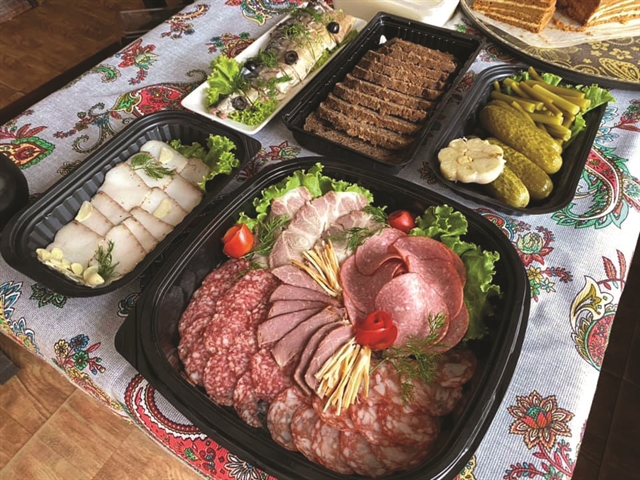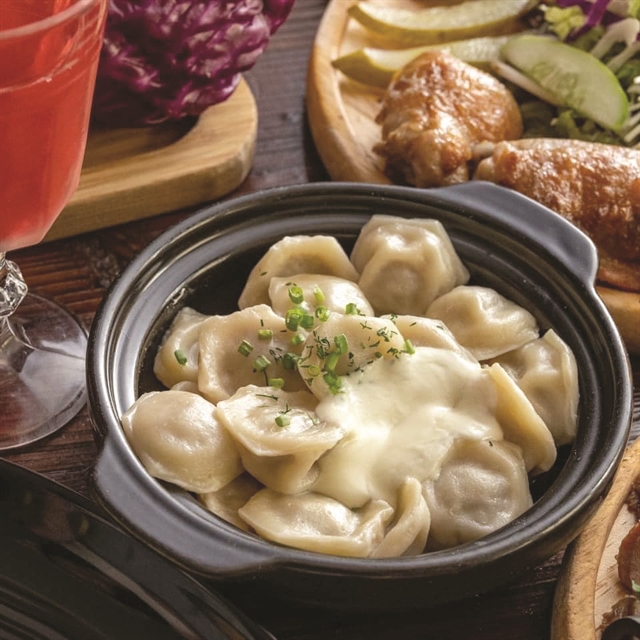
WELCOME HOME: Svetlana Nguyễn holding her freshly baked sourdough bread in front of her restaurant. Photos courtesy of the cafe
by Nguyễn Mỹ Hà
This week, Svetlana Nguyễn's personal story made headlines online. "Ukrainian lady who spent 20 years helping her husband recover from strokes" was the article that went viral. Svetlana took her husband's family name, but she still cannot speak Vietnamese.
Svetlana Nguyễn and her husband Nguyễn Văn Thắng got married in Kiev in 1988 before the Soviet Union collapsed in 1991. They settled in Ukraine until Thắng decided to come back to Việt Nam in 2001. Following a sudden stroke that he suffered in Việt Nam, Svetlana followed her husband to a new country and new culture where she does not speak the language.
Svetlana Nguyễn opened a small cafe serving Russian food in their home on Ngọc Khánh Street in 2004 and they named it Cafe CCCP (Russian abbreviation of the USSR). They use the former Soviet Union emblem for their logo, and on the sign board, they printed images of Karl Marx, Friedrich Engels and Vladimir Lenin. As if fate had it planned long before, the cafe and restaurant is located in the Mác Lê Nin neighbourhood, a residential area named after the Marx-Lenin Institute previously reserved for its staff.
They have three children and made an income from cooking Russian food for the local community, raising their children and covering the hospital bills as Thắng suffered from a series of strokes and his health deteriorated recently.
If it wasn't for the suggestion of my dining companion, I'd never know this place, CCCP, or in English, USSR home restaurant. Russian food was never on my list of must-try food. Uninviting names of fatty fares like the milk porridge, salted lard or boiled potatoes turned my attention away as I grew up on veggie-based Vietnamese food.

TRADITIONAL FARE: Popular dishes served at Cafe CCCP (clockwise from top right) mackerel, sourdough bread, pickles, cold cuts on lettuce and salted lard.
It was a beautiful autumn day in Hà Nội, when my dining companion insisted on taking me to this place, where he said has the best borscht soup in town. It was his personal way of commemorating the October Revolution day, a holiday he used to have back in his youth spent studying in Ukraine's capital Kiev.
CCCP isn't a standard restaurant you'd usually expect. It's rather like a living room in a Soviet model of housing with limited space, basic decoration of a small table with some chairs, a crochet table cloth, a wooden cupboard and some USSR posters on the walls.
My first impression wasn't positive. I was feeling as if we were intruding into the family's private life and did not feel comfortable at all. Some music from the Soviet time filled the air. There are a few other tables filled with diners. They seemed to know the place and each other well.
The people who dined there that day seemed to belong to a close-knit group, who either spent some time of their youth studying or working in the then Soviet Union. This is the place for people who knew what to expect when they go there. First-time visitors may be in store for a few awkward moments.
My dining companion explained to me the popular meals of the Kiev university kitchen he used to eat: borscht, usually more watery than it could be, bread, dumplings and marinated fish with boiled potatoes.

HEARTY MEAL: Meat dumplings called "pelmeni" served with sour cream are one of the best selling dishes.
The 1970's was not a great time for the Soviet Union. Food was scarce and people had to line up to purchase basics like bread and potatoes. But what the Vietnamese students were getting was still much better than in Hà Nội, in which the wartime food ratio limited the amount of rice per person at over 10 kilos and meat at about 300g a month. Hà Nội, though devastated and lacking everything a decent human existence required, still gathered all its resources to fight an unbalanced war with the world's No 1 military power.
What we may have today for one meal, used to be what our parents' generation had for a month during wartime.
Compared to the food at the student canteen back then, which is known as Stalovaja, what we have today at CCCP cafe is familiar but tastes much better, according to my dining companion.
First we had an assorted plate of Russian cold cuts (VNĐ200,000) including salami and salted lard. Varied pickles including sliced young cucumber and garlic should be a side dish for the meaty treats usually taken with a shot of Russian vodka.
Next comes the first dish, as they say in Russian, the borsch, or any other soup. The red borsch is a comfort soup. It's sweet-sour taste from pickled cabbage makes it delicious and easy to eat, just like Vietnamese beef stew with pickled mustard greens. I've tried borsch in Moscow and took a cooking class to learn how to make it with a Russian chef in St Petersburg. But none of them taste like Svetlana's borsch at the CCCP cafe/restaurant in Hà Nội.
The thick base, that results from long hours of slow cooking beef and potatoes gave her soup a smooth taste when you sip the first spoon. Borsch says so much about the chef who made it. It's popular in Slavic cultures, but each family has their own tips and secrets.
The next dish, or second, as the Slavic tradition has it, could be a meat, fish or pelmeni dumplings served with sour cream. We had shashlik, the roasted pork and chicken. The size was quite big, you get full if you go in two and order one portion.
When we had this meal, Thắng was clearly suffering from a stroke, but he could still help out with roasting the shashlik on charcoal. Upon hearing news about his deteriorating health, I'd wish them the best of luck and a miracle recovery.

The Russian traditional treat for Easter, kulichi. Not available on the daily menu, but can be ordered. Photo courtesy of the cafe
During Hà Nội's most recent social distancing period, that only ended last week, cafe CCCP offered a delivery service with freshly baked sourdough bread (VNĐ120,000 per loaf), Russian pickles, smoked fish, pelmeni dumplings (VNĐ250,000 per kilo), Russian salads including Shuba, Olivier and Mimosa. Meldovik honey cakes at VNĐ100,000 for 200gr and home-made drinks including kvas and kompot.
After the story went viral, many people wanted to donate to the couple to help out, but Svetlana Nguyễn made it clear on her Facebook account, that she would not take any money. She thanked everyone for extending their good wishes, helped to find a suitable hospital or doctor, but made it clear that she could support themselves by running the restaurant.
They have another Cafe CCCP in HCM City run by the couple's eldest daughter. VNS
OVietnam